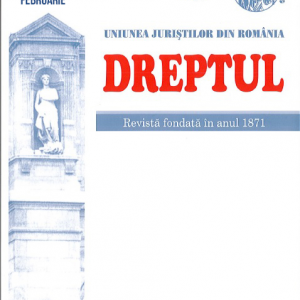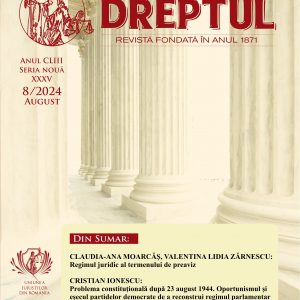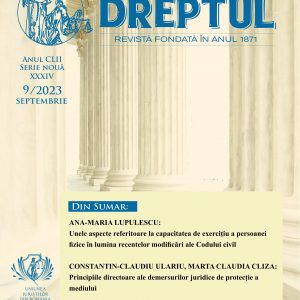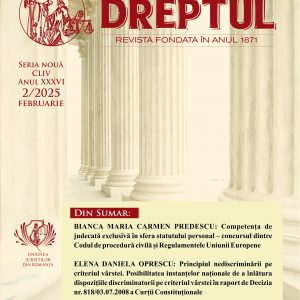-
 This study examines the manner in which the Romanian Constitutional Court has used in its practice the principle of non-retroactivity of the law with reference to service pensions. At the same time, the study contains a detailed critical examination of the thesis of the constitutional contentious court regarding the qualification of the laws amending or repealing the service pensions already in payment as non-retroactive and, therefore, in compliance with the constitutional requirements. On the other hand, the author of the study advances the thesis according to which any law that modifies the formula of calculation of the service pensions in payment, including by resorting to the extension of the contributivity rule, is retroactive and, consequently, unconstitutional. In substantiating this statement, there are initiated a series of considerations regarding the defining elements of the right to pension, the theories regarding the earned rights, as well as the development of a detailed analysis of the concept of legal effects produced during the application of another law (new law).This study examines the manner in which the Romanian Constitutional Court has used in its practice the principle of non-retroactivity of the law with reference to service pensions. At the same time, the study contains a detailed critical examination of the thesis of the constitutional contentious court regarding the qualification of the laws amending or repealing the service pensions already in payment as non-retroactive and, therefore, in compliance with the constitutional requirements. On the other hand, the author of the study advances the thesis according to which any law that modifies the formula of calculation of the service pensions in payment, including by resorting to the extension of the contributivity rule, is retroactive and, consequently, unconstitutional. In substantiating this statement, there are initiated a series of considerations regarding the defining elements of the right to pension, the theories regarding the earned rights, as well as the development of a detailed analysis of the concept of legal effects produced during the application of another law (new law).
This study examines the manner in which the Romanian Constitutional Court has used in its practice the principle of non-retroactivity of the law with reference to service pensions. At the same time, the study contains a detailed critical examination of the thesis of the constitutional contentious court regarding the qualification of the laws amending or repealing the service pensions already in payment as non-retroactive and, therefore, in compliance with the constitutional requirements. On the other hand, the author of the study advances the thesis according to which any law that modifies the formula of calculation of the service pensions in payment, including by resorting to the extension of the contributivity rule, is retroactive and, consequently, unconstitutional. In substantiating this statement, there are initiated a series of considerations regarding the defining elements of the right to pension, the theories regarding the earned rights, as well as the development of a detailed analysis of the concept of legal effects produced during the application of another law (new law).This study examines the manner in which the Romanian Constitutional Court has used in its practice the principle of non-retroactivity of the law with reference to service pensions. At the same time, the study contains a detailed critical examination of the thesis of the constitutional contentious court regarding the qualification of the laws amending or repealing the service pensions already in payment as non-retroactive and, therefore, in compliance with the constitutional requirements. On the other hand, the author of the study advances the thesis according to which any law that modifies the formula of calculation of the service pensions in payment, including by resorting to the extension of the contributivity rule, is retroactive and, consequently, unconstitutional. In substantiating this statement, there are initiated a series of considerations regarding the defining elements of the right to pension, the theories regarding the earned rights, as well as the development of a detailed analysis of the concept of legal effects produced during the application of another law (new law). -
 By the Decision No 369 of 30 May 2017, the Constitutional Court has declared as unconstitutional the phrase „as well as in other cash assessable claims worth up to ROL 1 000 000 inclusive”, included in Article XVIII (2) of the Law No 2/2013 on some measures to relieve the courts, as well as for preparing the implementation of the Law No 134/2010 on the Civil Procedure Code and has stated that „all judgments pronounced after the publication of this Decision in the Official Gazette of Romania, in the applications that are assessable in cash, less those exempted according to the criterion of matter, shall be subject to review”. Subsequently, the High Court of Cassation and Justice, by the Decision No 52/2018, has established that „the effects of the Decision of the Constitutional Court No 369 of 30 May 2017 are produced in respect of the judgments pronounced after its publication in the Official Gazette of Romania, in the litigations assessable in cash up to ROL 1 000 000 inclusive, initiated after the publication of the decision (20 July 2017)”.
By the Decision No 369 of 30 May 2017, the Constitutional Court has declared as unconstitutional the phrase „as well as in other cash assessable claims worth up to ROL 1 000 000 inclusive”, included in Article XVIII (2) of the Law No 2/2013 on some measures to relieve the courts, as well as for preparing the implementation of the Law No 134/2010 on the Civil Procedure Code and has stated that „all judgments pronounced after the publication of this Decision in the Official Gazette of Romania, in the applications that are assessable in cash, less those exempted according to the criterion of matter, shall be subject to review”. Subsequently, the High Court of Cassation and Justice, by the Decision No 52/2018, has established that „the effects of the Decision of the Constitutional Court No 369 of 30 May 2017 are produced in respect of the judgments pronounced after its publication in the Official Gazette of Romania, in the litigations assessable in cash up to ROL 1 000 000 inclusive, initiated after the publication of the decision (20 July 2017)”. -
 There are many questions concerning the context in which we witness the entry into force (on 25th May 2016) of the General Data Protection Regulation (GDPR) and its application (starting 25th May 2018). The answers can be numerous: political, sociological, journalistic, etc. However, we choose to analyse from the legal point of view. The GDPR was adopted taking into account the weaknesses that the Directive 95/46/EC has shown, specific weaknesses, in fact, of a EU legal act of this type, compared to the type of regulation. The Directive in question has failed to prevent the fragmentation of the way data protection has been ensured in all EU Member States. Legal uncertainty or public perceptions according to which there are significant risks to the protection of individuals, especially online, have been widespread. It is further added that the differences in the levels of protection existing in the 28 EU Member States, differences due to the transposition and application of the Directive, have sometimes led to a slowdown in the application of the principle of the freedom of movement of personal data within the EU, which may constitute real obstacles to economic activity at this level, distorting competition and preventing authorities from fulfilling their responsibilities under EU law.
There are many questions concerning the context in which we witness the entry into force (on 25th May 2016) of the General Data Protection Regulation (GDPR) and its application (starting 25th May 2018). The answers can be numerous: political, sociological, journalistic, etc. However, we choose to analyse from the legal point of view. The GDPR was adopted taking into account the weaknesses that the Directive 95/46/EC has shown, specific weaknesses, in fact, of a EU legal act of this type, compared to the type of regulation. The Directive in question has failed to prevent the fragmentation of the way data protection has been ensured in all EU Member States. Legal uncertainty or public perceptions according to which there are significant risks to the protection of individuals, especially online, have been widespread. It is further added that the differences in the levels of protection existing in the 28 EU Member States, differences due to the transposition and application of the Directive, have sometimes led to a slowdown in the application of the principle of the freedom of movement of personal data within the EU, which may constitute real obstacles to economic activity at this level, distorting competition and preventing authorities from fulfilling their responsibilities under EU law. -
 By the present study the author analyzes in a critical manner the modality of regulation of the mechanism of the compensatory review introduced by the provisions of the Law No 169/2017, which has amended the Law No 254/2013 on the execution of custodial sentences and of measures involving deprivation of liberty ordered by the judicial bodies during criminal trial. In this respect there are examined the case law of the European Court of Human Rights in the matter of the accommodation of detained persons and the premises that were the basis for the adoption of this regulation. Thus, it is noted that the legislator has set a higher standard than the one imposed by the European Court of Human Rights, which has ruled that, under certain conditions (the presence of ventilation, lighting and privacy, etc.), the accommodation in a detention space that ensures an area of between three and four square meters for each detainee is in accordance with Article 3 of the European Convention on human rights and fundamental freedoms. In addition, it is shown that the legislator did not insert in the national law the whole legal mechanism emphasized in the case law of the European Court of Human Rights, where a preventive means of appeal has been introduced, allowing the detained persons to file complaints to a judicial authority with regard to the material conditions of detention, as well as a compensatory means of appeal, which provides a reparation for the persons who have already been through a detention contrary to the Convention. Likewise, the author analyzes in a theoretical, but mostly practical manner, the modality to apply the compensatory review mechanism depending on the processual phase in which it is analysed its incidence, as well as the effects produced at the level of the institutions of substantive criminal law, making reference to the binding decisions pronounced by the High Court of Cassation and Justice and to the national case law.
By the present study the author analyzes in a critical manner the modality of regulation of the mechanism of the compensatory review introduced by the provisions of the Law No 169/2017, which has amended the Law No 254/2013 on the execution of custodial sentences and of measures involving deprivation of liberty ordered by the judicial bodies during criminal trial. In this respect there are examined the case law of the European Court of Human Rights in the matter of the accommodation of detained persons and the premises that were the basis for the adoption of this regulation. Thus, it is noted that the legislator has set a higher standard than the one imposed by the European Court of Human Rights, which has ruled that, under certain conditions (the presence of ventilation, lighting and privacy, etc.), the accommodation in a detention space that ensures an area of between three and four square meters for each detainee is in accordance with Article 3 of the European Convention on human rights and fundamental freedoms. In addition, it is shown that the legislator did not insert in the national law the whole legal mechanism emphasized in the case law of the European Court of Human Rights, where a preventive means of appeal has been introduced, allowing the detained persons to file complaints to a judicial authority with regard to the material conditions of detention, as well as a compensatory means of appeal, which provides a reparation for the persons who have already been through a detention contrary to the Convention. Likewise, the author analyzes in a theoretical, but mostly practical manner, the modality to apply the compensatory review mechanism depending on the processual phase in which it is analysed its incidence, as well as the effects produced at the level of the institutions of substantive criminal law, making reference to the binding decisions pronounced by the High Court of Cassation and Justice and to the national case law. -
 Legal issues of the contribution of spouses’ joint property to company’s establishment, the legal regime of shares acquired as consideration for this contribution, as well as the impact of the (Romanian) Family Code (effective during the period February 1st, 1954 - September 30th, 2011) and the Companies’ Law No. 31/1990 generated lots of controversy in the Romanian doctrine and jurisprudence between 1990 and 2011. With the enactment of the new Civil Code (Law No. 133/2009, republished, effective since October 1st, 2011) some of these controversies have been fully clarified. However, a good portion of them still exist today, generating further such debates and controversies. Such being the case, through this extensive study, the author examines, globally, the current legal regime of spouses’ joint property upon its impact with the Law No. 31/1990, examining, therefore, a series of questionable and controversial issues arising from the interference of legal regulations on the spouses’ joint property in light of the Romanian new Civil Code with the provisions of the Companies’ Law No. 31/1990, ultimately advancing several de lege ferenda proposals, for the settlement of all controversies arising from the impact of the two laws in question (the new Civil Code and Law No. 31/1990).
Legal issues of the contribution of spouses’ joint property to company’s establishment, the legal regime of shares acquired as consideration for this contribution, as well as the impact of the (Romanian) Family Code (effective during the period February 1st, 1954 - September 30th, 2011) and the Companies’ Law No. 31/1990 generated lots of controversy in the Romanian doctrine and jurisprudence between 1990 and 2011. With the enactment of the new Civil Code (Law No. 133/2009, republished, effective since October 1st, 2011) some of these controversies have been fully clarified. However, a good portion of them still exist today, generating further such debates and controversies. Such being the case, through this extensive study, the author examines, globally, the current legal regime of spouses’ joint property upon its impact with the Law No. 31/1990, examining, therefore, a series of questionable and controversial issues arising from the interference of legal regulations on the spouses’ joint property in light of the Romanian new Civil Code with the provisions of the Companies’ Law No. 31/1990, ultimately advancing several de lege ferenda proposals, for the settlement of all controversies arising from the impact of the two laws in question (the new Civil Code and Law No. 31/1990). -
 In international relations the old rule of law acta probant sese ipsa has not the same value as inside of a state because it is considered that an authority of a State who receive a document from another State should be put in an extremely difficult situation in terms of imposing the task of assessing the authenticity of a foreign document to the first sight. So, the use abroad of official documents from a State authorities require the completion of special formalities in order to ensure the originality, the authenticity of signatures/seal and legality of a specific document preparation. If by 1961, the year of concluded of the Hague Convention on Abolishing the Requirement of Legalization for Foreign Public Documents (to which Romania joined by the Government Ordinance no. 66/1999, approved by Law no. 52/2000), there was only legalization procedure, since that date appears apostille procedure (only for the states signatory to the Convention) determined by reason of simplifying the requirements necessary to be fulfilled for the validity of official documents abroad. The aim of the present study is to present the apostille procedure in the light of the provisions of the Hague Convention on Abolishing the Requirement of Legalization for Foreign Public Documents and of the Romanian provisions regarding this issue.
In international relations the old rule of law acta probant sese ipsa has not the same value as inside of a state because it is considered that an authority of a State who receive a document from another State should be put in an extremely difficult situation in terms of imposing the task of assessing the authenticity of a foreign document to the first sight. So, the use abroad of official documents from a State authorities require the completion of special formalities in order to ensure the originality, the authenticity of signatures/seal and legality of a specific document preparation. If by 1961, the year of concluded of the Hague Convention on Abolishing the Requirement of Legalization for Foreign Public Documents (to which Romania joined by the Government Ordinance no. 66/1999, approved by Law no. 52/2000), there was only legalization procedure, since that date appears apostille procedure (only for the states signatory to the Convention) determined by reason of simplifying the requirements necessary to be fulfilled for the validity of official documents abroad. The aim of the present study is to present the apostille procedure in the light of the provisions of the Hague Convention on Abolishing the Requirement of Legalization for Foreign Public Documents and of the Romanian provisions regarding this issue. -

-

-
 This study emphasizes that, from a substantial point of view, the criteria required to be fulfilled for cataloguing a deed as pertaining to the criminal domain are: the qualification of the deed in the domestic law, the nature of the deed and the purpose and the severity of the sanction. Formally, an official report of finding and sanctioning the contravention which represents at the same time also a criminal charge in the conventional sense must cumulatively include the description of the deed and the presentation of the legal classification. The effect of classifying the report of finding and sanctioning the contravention in the category of the criminal charge in a conventional sense is given by the fact that to the procedure for finding and sanctioning the contravention there are attached its own guarantees of a fair trial. The presumption of lawfulness of the report is compatible with the presumption of innocence only if it respects certain limits, taking into account the gravity of the stake and protecting the rights of the defence. The limits of the presumption of lawfulness of the official report, in the context of protecting the rights of the defence, are: the imperative that the deed be perceived directly, through its own senses, by the fact-finding agent and the exigence not to impose on the person concerned an impossible task, as regards the administration of the proof to the contrary.
This study emphasizes that, from a substantial point of view, the criteria required to be fulfilled for cataloguing a deed as pertaining to the criminal domain are: the qualification of the deed in the domestic law, the nature of the deed and the purpose and the severity of the sanction. Formally, an official report of finding and sanctioning the contravention which represents at the same time also a criminal charge in the conventional sense must cumulatively include the description of the deed and the presentation of the legal classification. The effect of classifying the report of finding and sanctioning the contravention in the category of the criminal charge in a conventional sense is given by the fact that to the procedure for finding and sanctioning the contravention there are attached its own guarantees of a fair trial. The presumption of lawfulness of the report is compatible with the presumption of innocence only if it respects certain limits, taking into account the gravity of the stake and protecting the rights of the defence. The limits of the presumption of lawfulness of the official report, in the context of protecting the rights of the defence, are: the imperative that the deed be perceived directly, through its own senses, by the fact-finding agent and the exigence not to impose on the person concerned an impossible task, as regards the administration of the proof to the contrary. -
 Pre-trial detention was defined as the most intrusive custodial preventive measure in the exercise of the person’s right to freedom, by which the judge or the court orders the detention of the defendant for the duration and under the specific conditions provided by law, in places specially intended for this purpose, in the interest of the criminal prosecution, the preliminary chamber procedure or the trial. In order to take pre-trial detention, it is necessary to meet all the general conditions provided by law for taking preventive measures, as well as the existence of at least one of the prev. of Article 223 of the Civil Procedure Code. In practice, in almost all cases, preventive arrest is based on the provisions of Article 223 (2) of the Civil Procedure Code. Under these conditions, we tried to create both a general presentation of these grounds and a theoretical analysis of the main issues that can generate confusion and problems in the application of the cases provided for by Article 223 (1) of the Civil Procedure Code. All this theoretical analysis has, as far as possible, been examined in conjunction with solutions from judicial practice, where appropriate.
Pre-trial detention was defined as the most intrusive custodial preventive measure in the exercise of the person’s right to freedom, by which the judge or the court orders the detention of the defendant for the duration and under the specific conditions provided by law, in places specially intended for this purpose, in the interest of the criminal prosecution, the preliminary chamber procedure or the trial. In order to take pre-trial detention, it is necessary to meet all the general conditions provided by law for taking preventive measures, as well as the existence of at least one of the prev. of Article 223 of the Civil Procedure Code. In practice, in almost all cases, preventive arrest is based on the provisions of Article 223 (2) of the Civil Procedure Code. Under these conditions, we tried to create both a general presentation of these grounds and a theoretical analysis of the main issues that can generate confusion and problems in the application of the cases provided for by Article 223 (1) of the Civil Procedure Code. All this theoretical analysis has, as far as possible, been examined in conjunction with solutions from judicial practice, where appropriate. -

-

